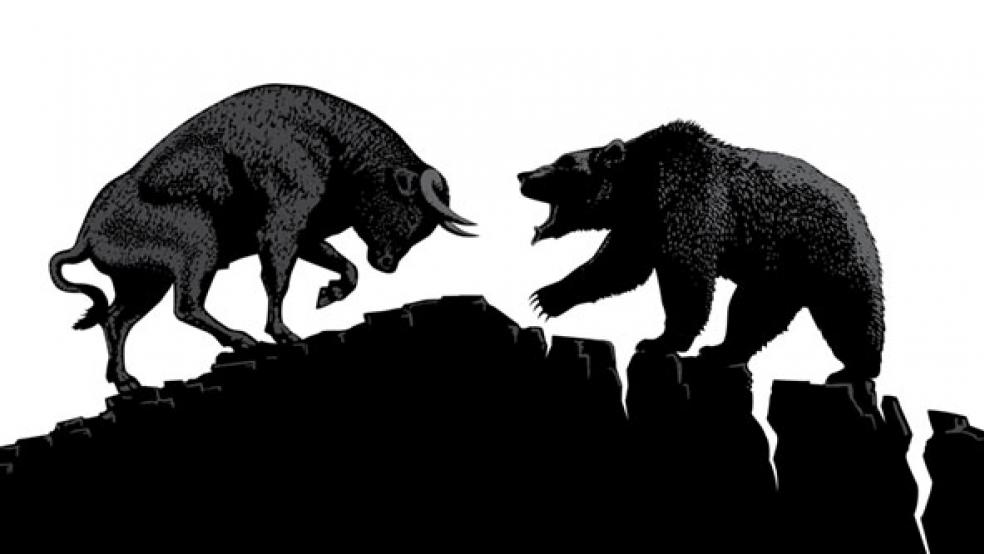Just when investors thought it was okay to jump back into equities, they got slapped by a barrage of bad news that shook the stock market hard and briefly pushed the Dow Jones Industrial Average below 12,000 for the first time in five months. The headlines were daunting: Higher oil prices. Instability in the Middle East. Sovereign debt threats in Europe. Creeping Interest rates. And now the horrifying earthquake and tsunami in Japan.
While current events may rattle those who are already worried about the fragile U.S. recovery, experts warn that individual investors should be careful not to react reflexively to bad news. Despite nearly a 2 percent drop on Thursday, U.S. stocks climbed on Friday, due partly to a calmer-than-expected day in Saudi Arabia. “If you say because of what’s happening in Libya or Egypt that you will buy oil — you’re not investing. You’re gambling,” says Joshua M. Brown, vice president of Fusion Analytics and author of The Reformed Broker. Brown notes that if you bought the “peace dividend” story after the Berlin Wall fell in 1989, you would have gotten caught in a two-year stock market recession. Similarly, if you pulled your money out of the market after 9/11, you would have missed a rally that lasted more than six years, he says.
“You cannot make your investment decisions by looking at a list of things to worry about. There will always be a list of things to worry about,” says Jeff Miller, an investment manager at NewArc Investments who also blogs at A Dash of Insight.
It’s not that concerns about world events aren’t justified. But experts say individual investors need to think in terms of their own needs; their personal time horizon, and their individual tolerance for risk. And they need to look at the big picture: Do the events signal a fundamental change in the larger investment story? Do they change the fundamental strength (or weakness) of growth in the U.S.? Do higher oil-prices really signal the start of rampant inflation? And if China tries to cool down its growth, will our trade deficit really worsen? There’s not enough hard evidence — so far, at least — that any of these bearish scenarios will come to pass, although some investors are preparing for them.
Sure, some big-time investors are adding to the insecurity. Bond expert Bill Gross recently said Pimco had shed all its exposure to Treasury securities. But the news was hardly shocking. For some time he had been saying that he was worried about the state of the market, especially once the Federal Reserve ends its easy money policy, known in the bond world as QE2, shorthand for the second round of quantitative easing. And among experts, Pimco’s shift on bonds indicates that risk is back. Safe haven investments are out of vogue. Volatility is back, which means you’re going to be seeing big moves in markets, both up and down.
“Companies have huge profits; their cost of capital relatively low; they have $2 trillion cash on the balance sheets. Corporate America is very sound and can offer investors a chance to cushion against these challenges,” says NewArc’s Miller. The events of the week haven’t changed his mind. Miller is buying big international companies that will benefit from growth, like heavy-equipment maker Caterpillar Inc. He’s also buying energy and leading financial companies, as well as technology and health care stocks. Forget the politics of ObamaCare, he says. Stay focused on the bigger story: “We are getting older. It’s a growing field.”
Bob Brinker, Brinker Fixed Income Advisor, is concerned about oil prices, but says inflation is not a front-burning problem because unit labor costs are stagnant and growth is weak. He’s putting investors into Ginnie Maes, as well as international bond funds at no-load companies like T. Rowe Price or Loomis Sayles to boost yields.
Like Brinker, DoubleLine CEO Jeffrey Gundlach, isn’t worried about inflation. He’s put about one-third of assets in Ginne Maes in his multi-asset fund. He’s put another 10 percent in emerging market fixed income bonds — but dollar denominated. The volatility is much smaller, he says. But he’s also concerned about the growing national debt burden, the high rate of unemployment and what happens after the stimulus packages end. So he’s got 30 percent in cash.
Jack Ablin, chief investment officer of Harris Private Bank, is worried about inflation. If you share this concern, you may want to consider his approach: Floating rate bank loans, international investment grade bonds denominated in the local currencies, real estate investment trusts, and master limited partnerships. But note that they all come with much higher risk. Miller at NewArc recommends a “ladder’ of bonds — investments that mature in seven years or less. As short-term notes mature, investors can put them into higher-yielding securities.
”The market loves uncertainty. Uncertainty is why a market exists. When there’s certainty, and everybody agrees, you want agreed to go away,” says Josh Brown. Just think about the housing market. Three years ago, everyone thought it was invincible. That was dangerous. A market that invites discussion and debate isn’t as dangerous. But investors need to focus and filter out the noise, which can be hard to do when the Internet is pouring out grim news 24/7.
“Do you expect the market will worry about protests in Libya 20 years from now? This too shall pass,” says Brown. “Our posture is to take a weighted-evidence approach. The data don’t tell us anything other than that we are in a garden variety correction.”
Related Links:
Stocks Make Stunning Rally on Day of Enormous Disaster (Business Insider)
Emerging Market Stocks Fall on Japan Quake, Chinese Inflation (Bloomberg)
Don’t Freak Out Oil Prices! (The Daily Beast)




